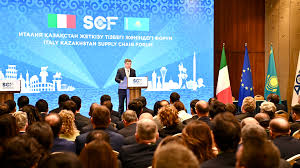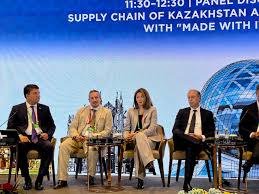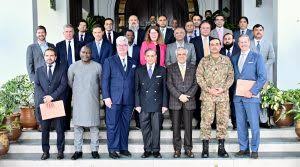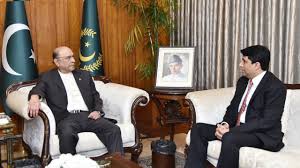Italy, Kazakhstan Push New Frontier in Trade Ties

Astana: Kazakhstan and Italy are exploring over $8 billion in potential partnerships across key strategic sectors, including energy, agriculture, logistics, and technology. The Italy-Kazakhstan Supply Chain Forum, on May 28 in Astana, aimed to deepen bilateral trade and industrial cooperation. The gathering was hosted on the eve of the Astana International Forum (AIF), set to take place on May 29-30.
The supply-chain forum was organized by the Italy-Kazakhstan Trade Association (ACIK) in collaboration with government agencies and business leaders from both countries. It followed the Italy-Kazakhstan Bilateral Forum in Milan last October and laid the groundwork for the next gathering in Italy.

In his opening remarks, Kazakh Prime Minister Olzhas Bektenov emphasized that the evolving strategic partnership between the two nations is driven by consistent efforts from both heads of state. Italy and Kazakhstan have established strong ties in the energy, machinery, chemicals, pharmaceuticals, and agricultural sectors.
He noted that bilateral trade rose by 25% last year, reaching nearly $20 billion, with Kazakh exports accounting for $18 billion. In the first quarter of 2025 alone, trade turnover hit $4.4 billion. Italy remains one of the top five EU investors in Kazakhstan, contributing $7.6 billion over the past two decades.
“The Kazakh government is systematically working to enhance the country’s investment climate. Our legislation offers a range of incentives for investors, including tax and customs benefits, in-kind grants, and support for infrastructure development. We also strive to continuously improve our support measures based on investor feedback, to ensure sustainable, long-term partnerships,” said Bektenov.
Ten memoranda of understanding worth 180 million euros (US$203.9 million) were signed during the forum. These span sectors including petrochemicals, machinery, agribusiness, metallurgy, and logistics digitalization. The agreements encompass joint production projects targeting markets in Europe, Central Asia, and China.

Trade and Integration Minister Arman Shakkaliev called the forum a milestone in bilateral relations.
“Kazakhstan places high importance on developing comprehensive, pragmatic, and long-term cooperation with Italy. We are not merely expanding trade, we are shaping a sustainable, innovative ecosystem capable of ensuring the stability of international supply chains amid the global restructuring of logistics, rising protectionism, and the digitalization of the world economy,” he said.
He highlighted Kazakhstan’s strategic position as a Eurasian hub, noting the rapid development of the Trans-Caspian International Transport Route (TITR) or the Middle Corridor. In 2024, shipments on the route rose 63% to 4.1 million tons, with container traffic increasing 2.6-fold.
According to the Ministry of Trade and Integration, Kazakhstan’s proposals include launching a joint investment fund for bilateral projects, co-developing a Digital Supply Chain 4.0 platform, introducing co-insurance tools for export and investment risks, and creating an environmental, social, and governance (ESG) roadmap aligned with global standards.
One notable proposal is a co-brand titled “Made in Kazakhstan with Italy” to symbolize advanced technological partnerships and value-added manufacturing.
Kazakhstan also expressed interest in expanding agro-industrial ties, particularly through the export of organic grain, oilseeds, and animal feed.
Industrial collaboration and local integration
Maire Group CEO Alessandro Bernini highlighted the growing opportunities in Kazakhstan for Italian companies.
“We see a country growing rapidly. I know Kazakhstan since 1995, when I was here for the first time, and today has undergone a fantastic transformation (…) The country is engaged in a huge investment plan, particularly in industrial development,” Bernini told The Astana Times.
“We are encouraging other Italian companies to move here, to Kazakhstan, to establish a structural presence in the country, because there are a lot of opportunities. We don’t see similar opportunities in the rest of the world,” he said.
Bernini emphasized the importance of integrating the local workforce. Maire Group has already partnered with a local university to hire graduates, share technical knowledge, and support the country’s industrial growth.
“We see that we can transfer our knowledge and experiences to many companies based here in Kazakhstan. Because, for sure, there is the ambition to grow for the local companies, but they have to evolve, they have to modernize their system. And we can fasten this process by working together,” said Bernini.
Livio Mazzuoccolo, the general manager of Confindustria, emphasized the need for more structured preparation for Italian small and medium-sized enterprises entering the Kazakh market. He noted that many small and medium-sized enterprises (SMEs) from Europe enter the Kazakh or broader Central Asian market with limited preparation, often lacking a solid business or industrial plan.
“Generally speaking, companies, for instance, European companies, come in Kazakhstan or in Central Asia without enough preparation. They give it a try, stay for 12 months, maybe paying consultant, spending money, probably without even having a real business plan or industrial plan,” he told The Astana Times.
He explained that proper market entry, including registration and sectoral analysis, takes approximately 16 months. For high-regulation sectors such as oil and gas, licensing adds complexity.
“So, what we do now is we transform Confindustria Kazakhstan into Confindustria Central Asia and Caucasus. And there will be an office of Confindustria only for gathering Italian company interest in the market,” added Mazzuoccolo.
Paolo Arrighetti, a senior vice president for corporate initiatives at Ansaldo Energia, pointed to Kazakhstan’s dual-track approach to energy transition as a practical model for balancing innovation with stability.
Paolo Arrighetti, a senior vice president for corporate initiatives at Ansaldo Energia. Photo credit: Nagima Abuova / The Astana Times
“Energy transition is definitely a key issue, not only for Kazakhstan, but worldwide (…) Kazakhstan is tackling this issue very well, because it wants to both promote renewable sources and renewable energies, but associating also to backing and creating stability through converting coal-fired plants into gas-powered plants,” Arrighetti told The Astana Times.
Arrighetti noted that the forum provided a concrete platform for initiating new industrial collaborations, particularly in infrastructure modernization and energy diversification.
“These kinds of events are enablers to meet with Kazakh stakeholders to explore opportunities for joint projects,” said Arrighetti.
He also highlighted Kazakhstan’s growing strategic importance for Italian firms seeking to expand in Central Asia, describing it as a new regional hub amid global shifts.
“The world has been changing in recent years, and Kazakhstan is playing a significant role in this region. It sits at the crossroads between China, Russia, and European countries. Kazakhstan can really be the right place to strengthen the relationship,” said Arrighetti.
“It has become the new center of this part of the world, and it is essential to carry on in this direction and take advantage of the positive opportunities created by the instability of other parts of the world,” he added.





